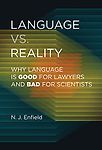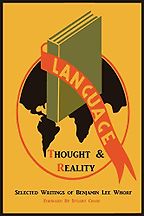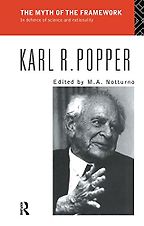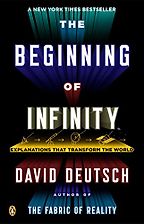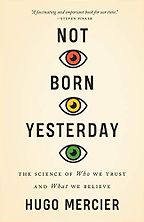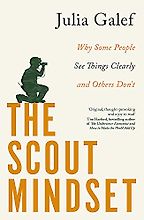You’ve chosen books relating to language and ‘post-truth.’ The basic idea you’re putting forward, I believe, is that language is intrinsically very inaccurate and biased. In a sense, language is post-truth. Is that right or am I going too far?
No, that’s not going too far. Obviously ‘post-truth’ is a very recent term—and none of the books that I talk about address it directly as a term or a concept—but it’s a very old phenomenon. My view is that language messes with our heads in a range of ways. So there’s a lot of research showing that language distracts us. It causes us to remember certain things and not others. It directs our attention. It provides what I call ‘off switches’ for the mind, which is to say that it is full of these nice packages of satisfying, familiar ideas. When things get presented to us in those packages, we don’t tend to question and process them further.
What I think is so interesting is that there are 7,000 different languages spoken in the world, and they’re all organized in very different ways. For any one language that nudges you, and supercharges your cognitive biases, there are 6,999 other languages that will do that in another way.
If you want to understand what language is, you need to embrace that it is both a destroyer and a creator. Language strips down reality, it biases you and nudges you in all these ways—but it’s also an incredible creative force. We have narrative, and there is so much to say about that. We build our social worlds and all sensemaking is done through narratives and words. All of that is a challenge for the science of what the language capacity really is.
What I argue in my book is that language is not very good for conveying truth about the world. It can do it, and it can do it pretty well in some domains. But what it’s really good for is persuasion and reason-giving and providing justifications for action and influencing other people in ways that are sometimes tailored to the moment quite strategically and in ways that are also derived from the history of different cultures. Every language is a historical record, in a sense, of how people have behaved in the past and what concepts have been important to them. So those are the challenges that my book is trying to bring to the concept of language.
You put that in the subtitle, right? Language is good for lawyers but bad for scientists.
Exactly. It’s purpose-built for lawyers. We can choose the words to frame an idea to direct people’s reasoning one way or another. The book goes through some of the science of this, but it also focuses on political discourse and ways in which things get reported by different media outlets or for different functions.
“Language messes with our heads in a range of ways”
The lawyer is a metaphor for anyone who has a position that they are going out to defend. The scientist, on the other hand, is a metaphor for anyone who really wants to know the truth and is prepared to be told that they’re wrong. They’re actually happy to find out that the truth is not as they thought it to be.
I found your book fascinating because it’s not just about catchy political slogans, it’s ubiquitous. Reading it made me stop and think whenever I was about to open my mouth. Let’s turn to the books you’ve chosen. What was your guiding theme in picking them?
At my university, I’m associated with a group that works on ‘post-truth.’ But what I’ve realized is that I don’t often use that word to think. I’m really grounding my idea of this problem in a much deeper literature. Once I started to think about things that way, these five books became obvious. I took a few notes just now before this call, just to remind myself why I think these books are interesting and why I grabbed them for you. They span 90 years or so. I hadn’t articulated the links, but they are really quite clear.
Let’s turn to the first book you’ve chosen which is Benjamin Lee Whorf, Language, Thought and Reality from 1956 and is a selection of his writing that was published after his death. Whorf has been immensely influential but is also quite controversial. Do you want to say a bit about him as well as the book, for people who might not have heard of him?
Benjamin Lee Whorf was a student of Edward Sapir, who was one of the most famous and influential linguists and anthropologists of the United States in the 20th century. Whorf was around in the first half of the 20th century and worked on Native American languages such as Hopi and Nootka. He was an accomplished linguist. He did work on deciphering Mayan hieroglyphs and some of that work is still cited within that literature.
He had another life as an insurance inspector and some of his most famous writing talks about that part of his history. He was regarded as eccentric. He was a bit of mystic, into thinking about cosmic stuff. He gets a bit of a bad rap because of that, though today, when you pick up books by physicists, they’re all about the meaning of life.
He was one of those unusual, genius people. He never really went on to have an academic career, he just published these papers that captured people’s imagination. He’s famous for arguing that languages affect your thinking and reasoning and behavior in different ways. It’s the idea that the language you speak determines how you think. He doesn’t ever really put it quite that strongly. As is often the case, a lot of those who critique him haven’t read the work that closely. But if you view him charitably—or even just objectively—you can see that he anticipated a lot of the themes of modern cognitive science through things like nudge theory, framing of language, directing your reasoning this way and that.
Get the weekly Five Books newsletter
One of the most interesting issues he raised that has not been taken nearly as seriously as it should have in cognitive science is the implications of linguistic diversity for cognitive diversity. A lot of this book is about laying out for you, ‘Look, here’s this language that describes a basic situation, like cleaning a gun barrel with a ramrod.’ He takes that simple action and unpacks it: ‘here’s how English construes that event.’ Then you look at a Native American language, which describes that event in a really different way. He has this lovely image of the monolingual person as somebody who can only see a single color. He says that if you’re one of the people who can only see blue, you wouldn’t even understand your predicament until you were shown other colors. That’s why we’ve got to go and study languages that are very much unlike our own, he says. That’s still something of a minority view but, very happily, in the last decade or two people are starting to take it a bit more seriously. Linguistic and cognitive diversity are taking more of a place in cognitive science. That’s in part due to Whorf.
Is this book the best introduction to his writings? I mean, is it a little bit academic, or is it quite readable?
It’s not highly academic, although it’s mixed. There isn’t much else that you can get with Whorf’s writings. There’s a book by Penny Lee called The Whorf Theory Complex, published in 1996, where she collects unpublished papers, but that’s less readable than this one. You can dip in and out of Whorf’s book. You can have it on the table and just read a chapter or half a chapter. Some chapters have illustrations. He’s got these weird and wonderful little cartoons inside the book, which are probably the most accessible aspects of what he’s describing.
How does the book relate to the topic we’re discussing, of language’s relationship with reality or even post-truth?
What we’re talking about is becoming more aware of how our understanding of reality is being directed by language through things like framing. Framing is everywhere, that’s the bottom line. It’s about becoming conscious of how affected we are by language and by different languages. It clearly relates to post-truth, but as I said earlier, it runs much deeper. It’s a problem, but it doesn’t have to do with the internet or even television: it’s something fundamental that humans have always had to deal with that’s got a lot to do with our cognition.
That makes sense. Then things like social media are just amplifying it.
Absolutely. They scale it up in this crazy way.
Let’s move on to the Karl Popper book, The Myth of the Framework from 1994. Again, I think this is a collection. Is it a series of his lectures?
Yes, it is. I think quite a number of Popper’s books are collections of essays. I’ve read quite a bit of Popper, but I’m not an expert. If we jump ahead to David Deutsch, the author of the next book, he is very seriously into Karl Popper and talks about Popper quite a lot. In an interview, when he was asked what the best book to read by Karl Popper was, he said The Myth of the Framework. That’s what directed me to the book. It’s phenomenal. It’s quite accessible and it’s very readable. In the book, there’s an essay called “The Myth of the Framework” which is the second chapter. The other chapters are related but that essay is the core of the book.
Popper was one of the most important philosophers of science of the 20th century, and also a very significant social science commentator. People know him for promoting the scientific method and combatting the idea that truth is a social construction and that kind of argument. He has a really important role to play in the whole conversation around post-truth because he’s saying, ‘No. There is reality, and we can get at it.’
The myth of the framework is that you can’t have a useful discussion unless you’re working within the same framework as the other person. People like to say that you must agree on the same things and then you can have a useful discussion, otherwise it’s not going to work. That’s a myth. You have to have a clash of cultures, that’s the term that he uses. You won’t make any progress if you have the same framework as the other person. You don’t want agreement. You don’t want unproductive disagreement, but you want disagreement.
“Popper is not as influential as he should be in this day and age”
So there’s a line in the essay where he says, that if you win in a debate, you’ve gained nothing. It’s not a win at all. It’s much better to have been proven wrong, or to have been made to shift your own view, even a little, than to supposedly win in a debate. This is a theme throughout his work and in this particular book it’s very succinctly and powerfully written.
He links that to the foundation of the scientific method, which is about coming up with a hypothesis of what’s happening. You have this idea in your mind: ‘I think I know what’s going on here, what’s causing this phenomenon.’ Then, what you have to do is to seek to disprove that, to prove yourself wrong. His point in The Myth of the Framework is that other people who disagree with you are very valuable in this process; you want them to be attacking you.
What you also want to do is to import that mindset into your own way of thinking. I’ve recently written about how you should learn to be your own ‘red team.’ A red team is something that tech and intelligence organizations use. It’s a unit within the organization that tries to find vulnerabilities and to hack into their own systems. That’s how they find problems and they can then fix them. That’s what Popper is talking about: how to be your own red team and the fact that you really need to do that.
He’s basically laying out the most important foundation of critical thinking, which is counteracting confirmation bias, consciously pushing yourself not to believe the things that you want to believe but to give yourself every possible reason not to. Only when you’ve failed can you then grudgingly move forward and accept that perhaps you have made some progress towards truth.
Also important is that he says we can learn to do this and enjoy it.
Is there a link to politics?
Absolutely. It is applicable to any situation in which you take a position. In politics, it’s a particularly egregious problem because we’re committed to a position and we do everything we can to defend it. It’s a completely non-rational thing to do. The antidote is what Popper is arguing for. You have to recognize when you are holding onto a position because you like it, because you want it to be true, because it belongs to you or identifies you in some way. You have to understand that getting at the truth is the only thing you should be doing. And the way to do that is to create this clash of cultures. It’s essential to political discourse, but it’s also essential that this clash of cultures is done well. It’s no good just to have people disagreeing. You have to have ground rules. It’s a methodological framework you have to agree on.
Let’s go on to the book by David Deutsch, who you’ve already mentioned. Tell me more.
David Deutsch is a physicist. He wrote a book in the 90s called The Fabric of Reality. This is his more recent book, and it’s called The Beginning of Infinity. It’s just a wonderfully entertaining romp through astronomy, physics at every scale, science, history, culture. It’s a fabulous popular science book, in a way, though it can also be challenging.
What’s central to the topic we’re talking about is that Deutsch picks up and develops Popper’s central concept that I just talked about in The Myth of the Framework. He crystallizes it around two ideas: conjecture and criticism. These are essentially labels for the things that Popper promoted and articulated. The idea of conjecture is that to explain what’s going on, you use your creative side, you conjecture a hypothesis, you come up with reasons why you think something is true. Then you’re subjected to serious criticism. All of the things we’ve said about Popper stand in terms of Deutsch.
“Politics is deeply embedded in identity and revenge…It’s not about getting to truths and good explanations”
Deutsch argues that this approach is what led to the Enlightenment and true scientific knowledge—and also cumulative knowledge that knows no end. That’s the beginning of infinity. Once you apply this way of thinking, it opens up the possibility of infinitely building knowledge. That’s what culture is: we often refer to it as cumulative. You’ve got to do it right. You can’t build on falsehoods because sooner or later reality will come for you. You’ll die or your spaceship won’t fly. That’s really the essence of it.
At the end of each chapter, Deutsch has a little summary page. He’ll say, ‘This is another manifestation of the beginning of infinity. Here’s how we open up an infinite world for ourselves through whatever the domain is that he has just worked through.’* It includes the domains of politics and culture, but also scientific innovation and how we can get to the stars.
Could you give an example of the process he’s describing?
Nothing that he’s proposing so far is really different from what Popper has argued. It’s just that Popper is not as influential as he should be in this day and age. Deutsch is saying, This really is the way to think about getting to the truth. An example is good science. Do you want a rocket to fly? You’d better know the truth. Those people who put the James Webb telescope into space, flying around the second Lagrange point a million miles from Earth, with a badminton court-sized sheet of gold capturing a vision of the universe—they didn’t do that by pulling stuff out of a hat. Over years and decades, they subjected themselves to the most intense self-criticism and that allowed them to achieve something almost unimaginable. Deutsch’s point is that every breakthrough in science is like that—whether it’s today or the old stories of Kepler and Newton (he also talks about those in the book). So that’s a fundamental piece of it.
The other thing to point out about this book is that Deutsch emphasizes that critique of an idea is important, but that it’s nothing without the conjecture side. You’ve got to have good explanations. You have to be able to recognize what a good explanation is. What does it consist of? How would it persist in the long term? He’s saying that the quality of explanations is really fundamental. You don’t go testing an idea unless you’re satisfied that there’s a high-quality, plausible explanation behind it and it’s not just some hunch. He is setting standards for imagining what’s true: you can’t just imagine anything’s true and try to critique it. You’ve got to know how to conjecture well.
Explanation is key?
Good explanation is key. One problem with the Popper-style method of getting at knowledge is just because you have a way of trying to falsify your hypothesis, that’s not reason enough to actually set up a research program and put resources into doing that. You have to have a good hypothesis based in an interesting, useful, well-founded explanation. What’s so interesting and useful about Deutsch’s book is that he lays out the components of what a good explanation looks like. Essentially, it’s a 21st-century version of Popper, applied in a rich and real way to quite a diverse set of demands. So it’s highly recommended.
How does it apply to politics?
He is able to convey the idea that the scientific method we’ve been discussing is applicable to any domain. In political discourse, that’s also the approach you should take. The challenge is how to get everybody doing that together. You have everyone on the same team: team truth. I’m attacking you not because I want to attack you, but because I want to get closer to the truth and to help you. There’s a whole shift there. Politics is not very much like that. Politics is deeply embedded in identity and revenge and those types of motivations. It’s not about getting to truths and good explanations.
Let’s move on to Not Born Yesterday by Hugo Mercier, which looks quite exciting because it’s arguing that we’re not that gullible. He writes, “At the end of the book, you should have a grasp on how you decide what to believe and who to trust” which sounds very useful. Tell me more.
Hugo Mercier is a French cognitive scientist who’s pretty young. He’s a student of Dan Sperber who is an anthropologist and a cognitive scientist. Together they wrote a book a few years ago called The Enigma of Reason. In that book, they said, ‘Look, cognitive science will tell you that the human mind is full of bugs, that we’re just hopeless at thinking, we fail all these tests.’ It’s received knowledge that we don’t have very good thinking systems. Confirmation bias would be an example of this. This is the idea that you don’t question your own view: what you do is look for reasons to believe it, and so you ignore information that would go against it (which goes precisely against Popper’s view of how you should proceed).
But they take an evolutionary view on it and say, ‘Hang on. Maybe our reasoning system is designed exactly as it should be, it’s just not designed for the purpose that you think. It’s not a device for getting us closer to the truth, it’s a device for generating persuasion.’ So if I have a position that I’m committed to, then I’m better off if I can spot good reasons to provide support for that position and then deploy those using language to convince others. I give them as reasons to others why they should follow me and my position.
So that’s the background to the Not Born Yesterday book. The sole-authored book is a follow-up book, in sense, grounded in work that he did together with Sperber and other colleagues. It’s a popularization of some of the more technical work they’ve done.
“Language is not very good for conveying truth about the world”
What’s so valuable about this book is that it’s a corrective, it’s a reversal of the received knowledge, which is that we’re all gullible. If you could just get control of the media, you can control the population. People vote for Trump or for Brexit because they’ve been brainwashed. He says, ‘No, that’s not the case at all. Humans are not gullible or easily brainwashed,’ and he gives a whole lot of data as to why he believes that. One of the memorable reversals—I reviewed this book for the Times Literary Supplement last year, and it’s the reversals that I emphasized—is of Voltaire, who gets quoted for saying that ‘those who can make you believe absurdities can make you commit atrocities.’** The idea is that you feed post-truth to the people, and they will come along and carry out genocide or Brexit. Mercier says, ‘No. It is wanting to commit atrocities that makes you believe absurdities.’ People are smart. Once they’ve got views and positions that they want to hold to for whatever reason—social reasons, normally—then they’re very good at finding reasons within the discourse around them that they can use to justify those positions. If people are disenfranchised or oppressed, if they are committed to a certain view, then they’re very good at spotting reasons to hold that view.
That’s the confirmation bias problem that Popper and Deutsch are saying is not helping us. Mercier’s book is trying to get us to understand that process. It’s too easy to tell people ‘Oh, you’re gullible and you’re being swayed and so forth.’ It’s one of those eye-opening, challenging books. In itself, it’s a nice red-teaming exercise. It’s saying, ‘You all have this view that people are gullible. We’re just not, it’s the exception, by far.’
Finally, let’s turn to The Scout Mindset by Julia Galef. This looks like perhaps the most popular of the books you’ve chosen, maybe verging on self-help?
You could call it self-help, but it’s highly intellectual. It’s super geek self-help. So Julia Galef has a podcast called Rationally Speaking. She’s originally from East Coast US but now lives in the San Francisco Bay Area. She’s also a founding member and president of the Centre for Applied Rationality, which is a bit like one of these modern sceptics’ societies. She’s all about, ‘We mustn’t be swayed, we must get closer to the truth. We must cut through all this noise.’ She’s really focused on the post-truth problem, arguing that we’ve got to be rational.
This book really distills her views on this, from all the work she’s been doing in this space for at least a decade. Her key idea is a metaphor that’s a bit similar to the one in my book about the lawyers and scientists. She uses the metaphor of a soldier as somebody who is defending a position, fighting for something that they stand for. That’s understandable in various circumstances, but that’s not how you get at the truth, for the reasons that we’ve been discussing in relation to Popper and Deutsch. You must not just go out to find good defences for your position, even if, as Mercier writes, that’s the natural thing for people to want to do. According to Julia Galef, you have to be a scout. In this military metaphor, a scout goes out to find out what’s going on on the ground, what the situation is. And then they come back and report. They say ‘there are troops over there’ or whatever the reality is. She’s basically saying that being a scout, not a soldier, is the right thing to do. That’s what leads us to truth and to understanding.
Five Books interviews are expensive to produce. If you're enjoying this interview, please support us by donating a small amount.
After that, what’s really nice about this book is that it’s something like a self-help book. It’s very nonacademic, very practical. It gives tips on how you should take a step back from your immediate reactions to things. I was interviewed by Sean Carroll the other day, and he mentioned something Julia Galef said in a podcast interview with him which is an example of the kind of thing she talks about in the book. She said that if she reads in the newspaper that ‘someone admitted x y z’ she strikes it out and puts ‘said’ instead. This is very much the kind of thing I talk about in my book. The word ‘admitted’ is a framing word, isn’t it? If a person admitted something, it suggests they didn’t really want to say it. It’s somehow self-incriminating, a victory for everybody else. So the book is full of tips like that, very practical, stopping yourself, thinking. It’s about awareness and mindfulness. I use that term towards the end of my book: it’s about being mindful of your own cognitive biases, the foibles you’re constantly subjected to. She’s trying to give ways to overcome those and head them off.
What I really like about this book is that it captures something that is really crucial in tackling the post-truth problem, which is that the only way we’re ever going to solve it is culturally, at the individual level. It’s about people choosing to practice the ethical use of language, the mindful use of language—not just in terms of being a good citizen, and what kind of language you serve up to others, but also when you hear things or read things being said in certain ways to be mindful. You imagine how else this could have been said. What ideas are being injected by the person who’s formulating the words? The book is self-help for individuals. It’s not saying, ‘Oh, here’s a top-down solution. We’re going to get Facebook to do this, that and the other, and we’re going to get Twitter to do this, that and the other.’ She doesn’t say that it doesn’t matter what they do, but she isn’t focused on whatever is happening in the infosphere, but on you. You’re in control of what happens when it gets into your head. You need that kind of mindfulness and that’s what the book offers. It’s an easy read, but it’s a really valuable read and it captures quite a lot of the other stuff we’ve been talking about.
* Editor’s note: At Five Books we have our own, weird grammatical convention where single quote marks denote an approximation of someone’s view, and double quotation marks denote a direct, accurate quote.
**En français: “Certainement, qui est en droit de vous rendre absurde est en droit de vous rendre injuste“—Voltaire, Questions sur les miracles (1765)
Interview by Sophie Roell, Editor
July 2, 2022. Updated: July 5, 2022
Five Books aims to keep its book recommendations and interviews up to date. If you are the interviewee and would like to update your choice of books (or even just what you say about them) please email us at [email protected]

